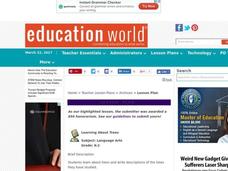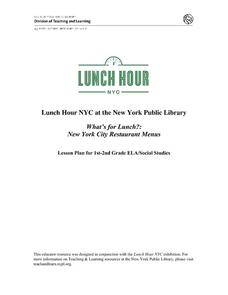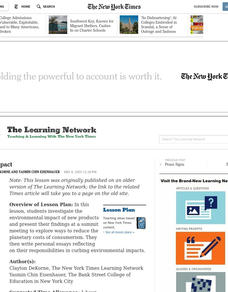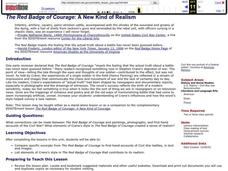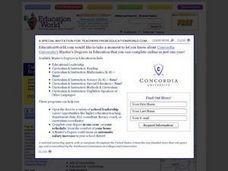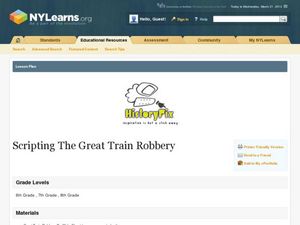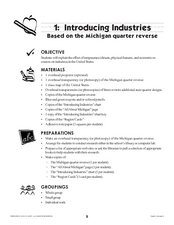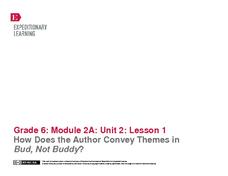Curated OER
Learning About Trees
After looking at pictures of trees, discussing tree growth, and identifying the parts of a tree, lead your class on a nature walk and have them collect samples and record their observations. They then work in pairs to polish the...
Curated OER
Writing Takes Shape!
Students read The Greedy Triangle and discuss geometric solids. In this geometry lesson, students list the geo-solids in the world and create a graphic organizer to show where geo-solids exist.
Curated OER
All Americana
Fifth graders research American landmarks and symbols. In this United States history instructional activity, 5th graders create a KWL chart about the symbols of America and take notes during a PowerPoint presentation. Students complete...
Curated OER
Government Protecting Rights
Students explore tribal sovereignty. In this American Indian lesson, students learn about tribal sovereignty, watch a movie, take notes, and complete a reaction paper.
Curated OER
George Washington Crossing the Delaware: A Study of Setting and Character
Learners examine "Washington Crossing the Delaware." In this American Revolution lesson, students analyze the painting, research its background, and then perform skits based on their findings.
Curated OER
A Primary Source Picture Book
Travel through Europe with ten-year-old Teddy Roosevelt in this writing activity, which uses the picture book My Tour of Europe: by Teddy Roosevelt, by Ellen Jackson. After reading the book, readers compare it to passages from The...
New York Public Library
What's for Lunch?: New York City Restaurant Menus
Do you remember the days when a cup of coffee cost five cents? At A.W. Dennett restaurant in 1894, you could buy a five-cent cup of coffee and as well as a five-cent slice of pie to accompany it. The menu from that year is a primary...
Hawaiʻi State Department of Education
Dance Critic
What do writing and dance have in common? They both have a six-trait rubric for assessment. Just like a good story, a good dance must have a hook, beginning, middle, end, logical sequence, and a climax. Learners use a...
Library of Virginia
An Overview of American Slavery
The final lesson in a unit study of American slavery asks young historians to synthesize what they have learned about how slavery in America changed over time. Revisiting the many documents they have examined, they consider the economic,...
Curated OER
Deep Impact
How can acknowledging opposing viewpoints reinforce one's argument? Use this New York Times lesson to study consumerism and the environmental impact of new products. After reading the article "Whether a Hummer or a Hybrid, the Big...
Curated OER
Animal Self-portrait Mosaics: A Visual Arts Elective
Out-lined here is a two-week procedure that has the class creating ceramic animal tiles that are metaphorical representations of their own personalities. They discuss animal images found throughout history, what they mean, metaphor, and...
Curated OER
The Red Badge of Courage: A New Kind of Realism
Is it possible to tell a true war story? Tim O’Brien says that fiction is for “getting at the truth when the truth isn’t sufficient for the truth.” To get at the truth about war, class members examine primary source materials from the...
Curated OER
Comparing Cinderella and The Rough-Face Girl
Pupils examine similarities and differences between cultures. They'll see that literature, reading, and story telling is something all cultures have in common. They should construct Venn diagrams to help them compare and contrast the...
Education World
Edible Resource Maps!
Young scholars discuss resource maps and examine examples from library resources. Working in groups, they create edible resource maps by drawing examples, such as popcorn on the border of Iowa and Nebraska. Then they use cookies in the...
Curated OER
Antonyms, synonyms and homophones
Shed light on what antonyms, synonyms, and homophones are. In this lesson plan, upper elementary schoolers create pairs using an antonym, a homophone, and/or a synonym. Then they play an antonym matching game.
Curated OER
Appalachia
Middle schoolers investigate the benefits of dance and participate in dances. In this dance lesson, students investigate a number of dances such as square dancing and clogging that are native to Appalachia. They use math concepts to...
Curated OER
Nuts for Peanuts: Peanut Plants, Peanut Timeline, and Peanut-s-timation!
Students complete a timeline. In this peanuts lesson, students read A Short Peanut History and use this resource to make a timeline of the history of the peanut. Students can grow peanuts in the classroom or make various peanut recipes.
Curated OER
Geo-Class Mapping My Neighborhood
Students create a map of the school and surrounding neighborhood. In this mapping lesson, students discover their school's location and learn about its past. Students use math skills and the steps in the design process to...
Curated OER
Plagiarism
Don't get caught plagiarizing! Before starting your research unit, use this lesson plan to help your young writers identify plagiarism. The truth is, many kids don't even realize when they're doing it! They practice citing sources when...
Curated OER
Scripting The Great Train Robbery
Take writing prompts to another level in this activity, which allows pupils to create scenes of dialogue based on the 1903 silent film, The Great Train Robbery. Useful for a language arts/history cross-curricular activity, the lesson...
Curated OER
Introducing Industries
If you are looking for a way to explore Michigan's resources, physical features, and more, this lesson is for you. After discussing Michigan and the Great Lakes, learners fill out a graphic organizer identifying the state's natural...
Curated OER
For the Love of Publication!
What is a ‘Zine? Although the referenced PBS video that launches this study of self-published magazines is not available, the activities detailed and the step-by-step directions for creating ‘Zines would engage young writers. This...
Curated OER
Lincoln is in the House! ("Name-Dropping" Poems and the Power of Connotation)
“What’s in a name?” Just about everything. Barack Obama, Vincent van Gogh, Justin Bieber. Famous names evoke a multitude of reactions and poets often use the names of famous people in their works precisely because names carry...
EngageNY
How Does the Author Convey Themes in Bud, Not Buddy?
After reading up to chapter 12 of Bud, Not Buddy by Christopher Paul Curtis, scholars read chapter 13 and take part in a grand conversation about the author's writing techniques. Pupils discuss how his writing conveyed literary themes...
Other popular searches
- Fifth Grade Library Lessons
- Library Lessons K 2
- Elementary Library Lessons
- Library Lessons & November
- Kindergarten Library Lessons
- Library Lessons Grade
- Library Lessons for Preps
- Halloween Lessons Library
- Teks Library Lessons
- Library Lessons on Blogs
- Third Grade Library Lessons
- Library Lessons Grade 7


